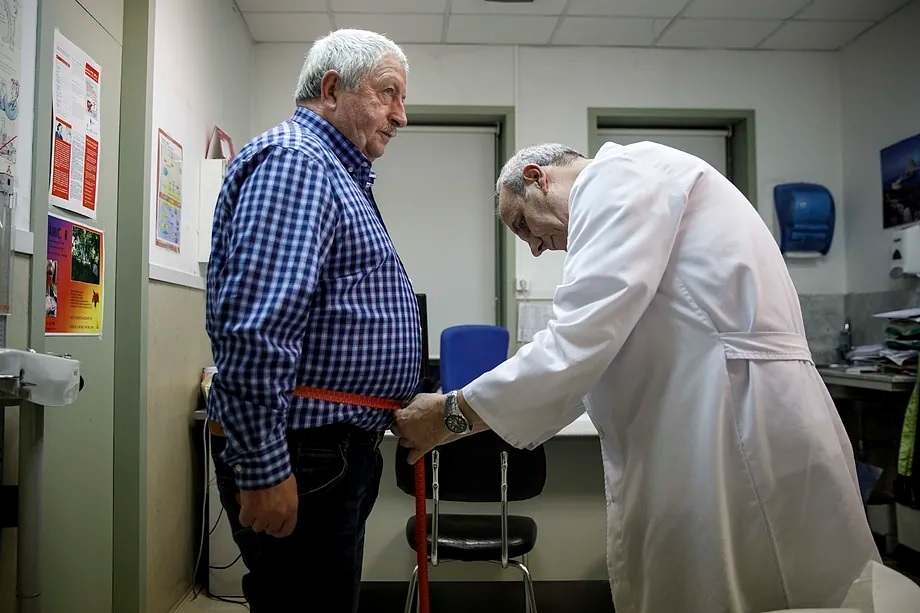At two years, bariatric surgery achieves a weight loss five times greater than GLP-1 receptor agonist drugs. This is the main conclusion of a study conducted in real-life conditions just presented at the American Society for Metabolic and Bariatric Surgery (ASMBS) congress in Washington.
The study, led by the New York-based center NYU Langone Health, compared the results obtained with sleeve gastrectomy and gastric bypass against injections with semaglutide or tirzepatide.
They revealed that patients undergoing surgery lost on average over 26 kilos at two years compared to the approximately 5.5 kilos of those treated with GLP-1 for at least six months (24% weight loss vs. 4.7%). Patients on continuous GLP-1 treatment for one year lost more weight, but significantly less than those who underwent bariatric surgery (7% total weight loss).
Juan Carlos Ruiz de Adana, Head of the General Surgery and Digestive System Service at the Getafe University Hospital in Madrid, comments to DM, with the caution always observed in a retrospective study, that the presented results are consistent: bariatric surgery also affects the endogenous secretion of GLP-1, molecules that promote weight loss and metabolic control, the mechanism of action of these new drugs. "It is logical that, as shown in this work, surgery achieves more potent and intense effects than drugs. Additionally, it has been measured in the two years following the intervention, the period in which the action on these incretins is more intense."
The head of the Esophagogastric Surgery and Obesity Unit, a national reference in the treatment of this disease, emphasizes that while the effects achieved are more intense with surgery, "it is also necessary to consider that surgical intervention has risks that do not accompany pharmacological treatment." All this must be weighed when indicating treatment to each patient.
"There are patients whose BMI places them at the threshold for surgical indication that with drugs can avoid, or at least delay, an operation. But it is clear that patients with severe obesity and metabolic disorders, especially if not well controlled, will benefit more from surgery. Both in weight reduction and metabolic control as well as in psychological aspects - analyzed in another study conducted at Tulane University - bariatric surgery achieves more intense effects than pharmacological treatment."
The surgeon points out that in the United States, since the arrival of GLP-1 drugs, bariatric interventions have decreased by 25%, but the situation in Spain, with the National Health System (NHS), is somewhat different, as patients usually have to wait to be operated on.
Ruiz de Adana also emphasizes the importance of lifestyle in managing obesity. "Drugs have an effect as long as they are administered, and surgery, after a few years, loses its effect. Long-term results will depend a lot on the habits that the patient incorporates."
For the study, data from 122,595 patients from electronic medical records from NYU Langone Health and the NYC Health + Hospitals public hospital network were used. The included patients had a body mass index (BMI) of at least 35 and underwent sleeve gastrectomy or Roux-en-Y gastric bypass, or were prescribed semaglutide or tirzepatide between 2018 and 2024. After adjusting for certain factors, they compared the results of 14,152 patients matched with one of the treatments.
"Clinical trials show a weight loss of between 15% and 21% for GLP-1s, but this study suggests that real-world weight loss is considerably lower even for patients with active prescriptions for a whole year. We know that up to 70% of patients may discontinue treatment within a year," says the first author of the study, Avery Brown, a surgery resident at NYU Langone Health. "Patients treated with GLP-1 may need to adjust their expectations, adhere more closely to treatment, or opt for metabolic and bariatric surgery to achieve the desired results," he concludes.
According to the study's lead author, bariatric surgeon Karan R. Chhabra, a professor at NYU's Grossman School of Medicine, these results call for further investigation with more studies, among other aspects, into what is the most suitable patient profile to receive bariatric surgery instead of pharmacological treatment, optimizing results.
"While both groups of patients lose weight, metabolic and bariatric surgery is much more effective and long-lasting," says ASMBS President Ann M. Rogers from the Penn State Health hospital network, who did not participate in the study, in a statement released by the scientific society. "Those who do not achieve sufficient weight loss with GLP-1s or have difficulty adhering to treatment due to side effects or costs, should consider bariatric surgery as an option or even in combination."
More mental health benefits
Bariatric surgery has also been shown to be superior to drugs in relation to potential psychiatric disorders associated with obesity. In another study, also presented at the ASMBS congress, it is shown over a five-year period that individuals undergoing metabolic and bariatric surgery are much less likely to develop them than those treated with pharmacotherapy.
The risk of developing cognitive deficits was 54% lower; 18% lower for anxiety disorders, and 17% for substance use disorders.
The research team from the Tulane University School of Medicine in New Orleans conducted a retrospective analysis of patients undergoing metabolic and bariatric surgery and patients treated with semaglutide, liraglutide, and dulaglutide, using the TriNetX database. After matching the data based on demographic and clinical characteristics, they compared 33,600 surgical patients and 33,600 pharmacological therapy patients regarding the incidence of new psychiatric disorders. The follow-up period lasted up to five years.
Based on these results, "metabolic and bariatric surgery confers a strong protective effect against common mental health disorders in a direct comparison with GLP-1 pharmacotherapy," says study co-author Shauna Levy, head of the Minimally Invasive/Bariatric Surgery Division at Tulane University School of Medicine, in a statement released by ASMBS.
The authors also emphasize the importance of "taking into account mental health outcomes when selecting treatment modalities for people with obesity." And the need for research into the "underlying mechanisms of these benefits to guide personalized treatment strategies."
